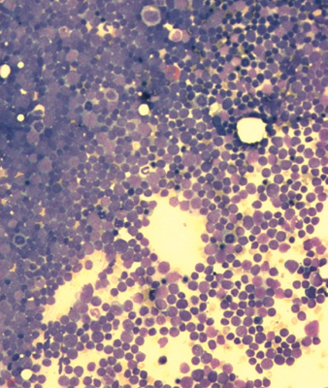Down Syndrome Ups Risk for Infection-Related Death in Pediatric ALL
Researchers have identified Down syndrome as a risk factor for infection-related mortality among pediatric patients with acute lymphoblastic leukemia.
ALL smear; source: Jimjamjak, Wikimedia Commons

Researchers have identified Down syndrome as a major risk factor for infection-related mortality among pediatric patients with acute lymphoblastic leukemia (ALL) enrolled in the Medical Research Council UKALL 2003 trial.
“Our analysis demonstrated that a significant proportion of sepsis deaths occurred during induction and during periods of neutropenia,” wrote researchers led by David O’ Connor, MD, of Imperial College London. “Thus increased awareness of the potential for septic complications is required when caring for patients during these high-risk periods.”
The currently reported rates of treatment-related mortality in trials of patients with ALL is between 2% and 4%, with the most common cause being infection. With ALL having such high survival rates in low-risk patients, reducing infection-related mortality is an important goal for improving outcomes with children with this disease, according to O’Connor and colleagues.
To date, few studies have investigated risk factors for infection-related mortality in pediatric patients with ALL. In an attempt to provide more evidence, the researchers conducted this retrospective analysis of cases of infection-related mortality that occurred in patients in the large, multicenter, Medical Research Council (MRC) UKALL 2003 trial. MRC UKALL 2003 was a study of children and adolescents with ALL diagnosed at 45 centers in the United Kingdom and Ireland. Patients were aged 1 to 20 years.
For this analysis, infection-related mortality was defined as any death that occurred in the presence of clinical or microbiological documented infection. The results were published in Blood.
Among the 3,126 patients in the UKALL 2003 trial, 249 deaths occurred, including 117 (47%) from treatment-related mortality. Sepsis was identified as the most common cause of treatment-related mortality, accounting for 64.1% of all treatment-related deaths.
At 5 years, the cumulative incidence of death was 8.5% for patients in the trial; treatment-related mortality was 3.8%. The cumulative incidence of infection-related mortality was 2.4%, which equates to 30% of all trial deaths.
The researchers conducted a multivariate analysis to identify factors that were associated with an increased risk for infection-related mortality. Patients with Down syndrome had a significantly increased risk (odds ratio [OR] = 12.08; 95% CI, 6.54-22.32; P < .0001).
“Down syndrome patients were at increased risk of infection-related mortality compared to non-Down syndrome patients in all trial phases,” the researchers wrote. “However, whilst most infection-related mortality occurred in the induction phase in non-Down syndrome patients, infection-related mortality in Down syndrome patients was spread relatively evenly throughout all trial phases.”
Girls were also found to have an increased risk (OR = 1.63; 95% CI, 1.02-2.61; P = .02). In addition, patients who were treated with a higher intensity regimen also had increased risk for infection.
Sepsis was found to have occurred more commonly in the induction and post-induction phases of treatment. However, infection-related mortality made up 77.6% of the treatment-related mortality during the induction phase compared with only 56% of treatment-related mortality in other phases (P = .02).
“Bacterial infections were the leading cause of infection-related mortality,” the researchers wrote. “However, in contrast to research that has highlighted the prevalence of gram positive infections in pediatric ALL, we found that gram negative bacteria were most frequently implicated in infection-related mortality. In particular, pseudomonas was the single commonest cause of treatment-related mortality.”
2 Commerce Drive
Cranbury, NJ 08512
All rights reserved.